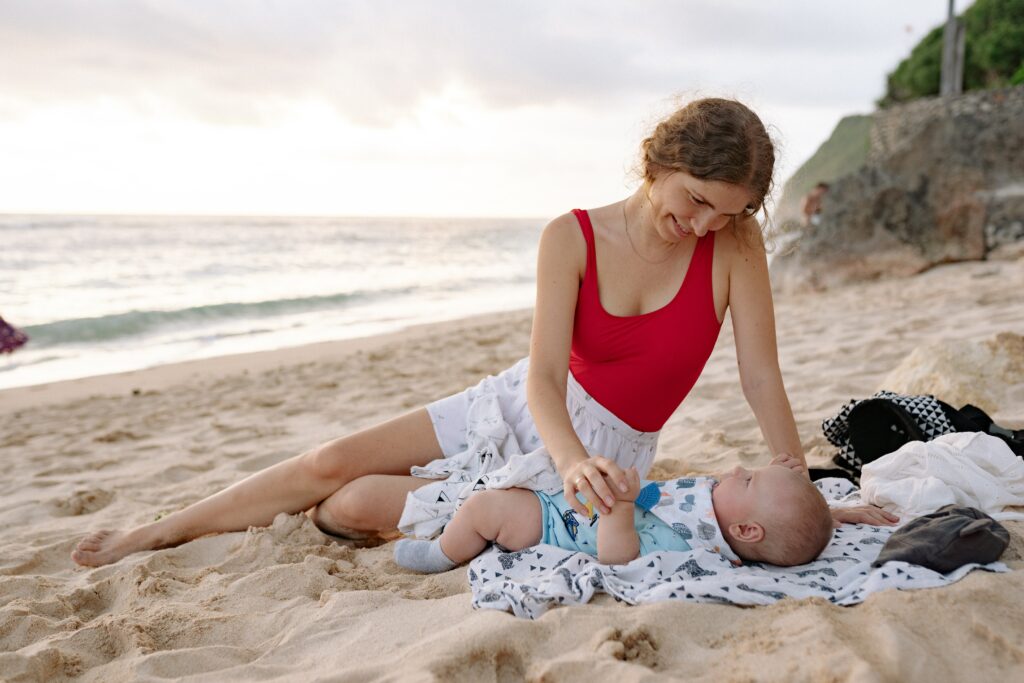 Much of breastfeeding is the same year-round. However, as a certified breastfeeding counselor (CBC), it is not uncommon to get questions specific to different seasons. Breastfeeding in the summer can have a few bumps.
Much of breastfeeding is the same year-round. However, as a certified breastfeeding counselor (CBC), it is not uncommon to get questions specific to different seasons. Breastfeeding in the summer can have a few bumps.
As a CBC, being prepared to answer common questions is important. There are many myths related to caring for an infant in the summer. You can help dispel myths and provide tips to make feeding easier.
Do Newborns and Young Infants Need Water?
For breastfed newborns and young infants, it is important they do not get plain water. Their small systems are sensitive to electrolyte balances and water can throw off their systems.
Even in very warm weather, breast milk is typically all an infant needs. Breast milk at the breast is a living substance and alters to meet the needs of an infant. Frequent feeds in warm weather is not a sign of supply dips. It is a sign of the body meeting baby’s need for more hydration.
If there are concerns about dehydration for any reason, clients should reach out to a healthcare provider. They might recommend alternatives, but rarely plain water.
Water is typically reserved for infants old enough to consume solids. They usually only have a few total ounces per day with solids. Water should complement the solids, and neither should replace the amount of breast milk an infant under one consumes.
Breastfeeding Parent Should Hydrate Well
Generally, it takes frequent dehydration to cause supply issues. However, staying optimally hydrated ensures better wellness for the breastfeeding parent. The parent matters! Encourage clients to stay hydrated so they feel their best.
When breastfeeding, it is easier to become dehydrated. As a CBC, it’s important to remind breastfeeding parents how important they are. Remind them to care for themselves. They will feel better and are less likely to stress about their supply.
Breastfeeding Friendly Clothes Can Help
When the weather is warm, it can be overwhelming to navigate thick nursing bras, pads, etc. Purchasing thin nursing tanks, low cut summer dresses, nursing dresses, etc. can make it easier to feed.
Reusable bamboo or cotton nursing pads can be more comfortable than paper disposable ones. This can reduce discomfort and disposable ones sticking to your sensitive skin.
Using breathable cotton clothing can be helpful in warm weather. Many women find sweat and leaked milk to be rather uncomfortable. Wearing cotton clothing is breathable and may reduce some irritation.
Be Cautious With Nursing Covers
Legally, anywhere a mother and baby are allowed to be, they can breastfeed with or without special covers. No one should ever feel obligated to use a cover. However, some parents find a cover more comfortable for themselves or when baby is in a curious stage. Easily distracted babies sometimes struggle to focus on feeding.
In hot weather, it is very important to be cautious of overheating baby by using a cover. Skipping covers if you’re outdoors, or just draping a small cover over any exposed breast and not baby, can make it easier to keep baby comfortable.
If one still really desires to use a cover, a thin muslin blanket is often an ideal cover.
Don’t Overthink It
For new parents, the changes in season, their baby’s everchanging development, they can all cause concerns. It’s important to remind parents that babies live all over the world in all sorts of climates. Remind them that breastmilk is made specifically for human babies.
It is a living substance which changes based on exposure to temperatures, germs, time of day, baby’s age and more. Best of all, if they’re out and a bout and baby is suddenly thirsty earlier than normal due to heat, they’re always prepared!